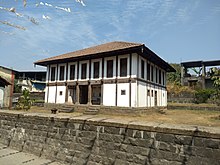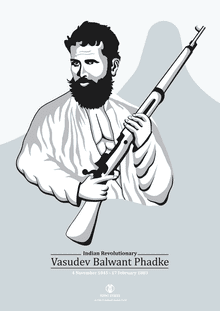Praised for his efforts and regarded as the Father of the Indian Armed Rebellion Vasudev Balwant Phadke a Chitpawan Brahmin organized the secret army of revolutionaries consisting of local tribes and declared war against the colonial regime of the British Empire.

Initially dedicated to serving the British Government Vasudev Balwant grew resentment due to the harsh treatment of the Indians by the British officials. While the eminent political figures of that era tried to sign petitions and agreements with the Raj Vasudev Balwant Phadke forged unstoppable hordes of warriors and fought for the attainment of the much-awaited Swaraj.
Content
Background Early Life
Phadke was born on 4 November 1845 in Shirdhon (Maharashtra). From his childhood, he had heard the stories of valor and sacrifices of Marathas. His grandfather Anantrao is believed to be the last in charge of the fort of Karnala which was won by the Raj in the third Anglo-Maratha Struggle in 1818.

Phadke was an enthusiastic personality who wholeheartedly immersed himself in freeing his motherland from the clutches of a European powerhouse. In the year 1865 after becoming a graduate of the famous Bombay University Phadke started to work under the British government in the Department of Military Finance.
The First Armed Rebellion: Rise of Vasudev Balwant Phadke
After serving the British for a few years things started to take a turn. While working in the cantonment the British officials refused to grant Phadke the necessary leave to see his ailing mother.
A year later the British again denied Phadke the leave to attend his mother’s death anniversary. This type of inhumane behavior from the British officials filled the heart of the young Vasudev with resentment against the Raj.
Furthermore, his nationalism was further fuelled by the writing and journals of M.G. Ranade and Naoroji. The concept of the Drain of wealth and how the British exploited the resources of the Indian masses for their own purpose deeply saddened him and he decided to fight for their right at all cost.
Phadke even trained his second wife Gopika Bai in the field of horse riding, sword fighting, and education. Furthermore, the treatment of the British towards the famine-affected areas was very harsh.
The Deccan Famines of 1886-87 greatly affected the peasants however the colonial officials increased the revenue demands from the locals. The British increased the revenue demands up to 50 percent which further deteriorated the conditions of the peasants.
This act of bigotry from the Raj confirmed the mind of Phadke that only an armed insurrection against the colonial regime could bring peace to the Indian subcontinent. After coming in contact with Raghoji Salve who influenced many freedom fighters Phadke launched his struggle.
Gathering the support from the Ramoshi Community Phadke in 1875 launched his struggle against the Red Coats. His army also had members from the tribes like Kolis, Bhils, and Dhangars.
He gave lectures from village to village in order to generate the goal of Swaraj in the heart of every local citizen. Together with his band of revolutionaries, Phadke raided the British regions of Konkan and territories lying in the vicinity of Mumbai.
They also targeted the railway and other communication sectors to interrupt the British resources. His daring raids over the British-controlled regions made him a hero in the eyes of every Indian. In the year 1874, he along with his associates set up the foundations of the Poona Native Institution in order to attract young children to the freedom struggle.
To gather the support of peasants who were deeply affected by the famines, droughts, and British exploitation Vasudev founded the Aikyavardhini Sabha in 1874. Many historians have praised the relentless efforts and spirit of Phadke and his men.
The British in order to curb the rebellion announced a reward of rupees 4000 on the individual who had the info of Phadke and his associates. To counter this move Raj Vasudev announced a reward for the individual who will hand him the custody of the Governor of Bombay.
On 20 July 1879, the British captured Vasudev from the Bijapur district and sent him to Aden (in Yemen) where he attained martyrdom on 17 February 1883. His incessant struggle for freedom later influenced men like Bal Gangadhar Tilak, Bankimchandra, Mahatma Gandhi and the list goes on.
LIKE WHAT WE ARE DOING? DONATE TO DHARMAYUDH
If you support what we are doing and would like to contribute to help us grow and reach more Indians to teach them more about such forgotten historic Indian Heroes and stories, please consider donating any amount. It will help us grow.

